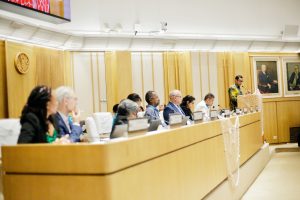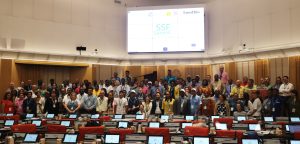Participants at the SSF Summit in Rome in July 2024 called for stronger alliances among the diverse actors in the arena
This article is by Ronald Rodriguez (rrodriguez.icsf@gmail.com), Programme Officer, ICSF and Elyse Mills (elyse.icsf@gmail.com), Programme Associate, ICSF
The second international Small-scale Fisheries (SSF) Summit took place at the headquarters of the Food and Agriculture Organization of the United Nations (FAO) in Rome, Italy, from July 5-7, 2024, prior to the 36th Session of its Committee on Fisheries (COFI). This Summit built upon discussions that emerged during the first Summit in 2022, focusing particularly on tenure rights and social development as key themes of concern for small-scale fishworkers globally.
The organizing team included the Working Group on Fisheries of the International Planning Committee for Food Sovereignty (IPC); the General Fisheries Commission for the Mediterranean (GFCM); SwedBio; the Small-scale Fisheries Resource and Collaboration Hub (SSF Hub); and FAO.
Around 300 people registered to participate, more than doubling the 145 participants in the first Summit. Half of the participants this time around were representatives of SSF organizations, including a strong IPC delegation, while the other half represented inter-governmental organizations, non-governmental organizations (NGOs), academia and governments.
The Summit programme involved a series of plenary and smaller group discussions, in which participants gathered by region and language to discuss the experiences of small-scale fishworkers in Africa, Asia, Latin America and the Caribbean, Europe and North America. Translation services were provided in the plenary sessions in Arabic, English, French, Italian, Portuguese, Spanish and Turkish.
The first day was reserved for representatives from small-scale fishworkers’ organizations, and invited support organizations, including ICSF. The day focused on engagement, dialogue and building solidarity among representatives from various SSF contexts around the world.
This Summit built upon discussions that emerged during the first Summit in 2022, focusing particularly on tenure rights and social development as key themes of concern for small-scale fishworkers globally
The second and third day were open to all other participants, and emphasized the commemoration of the tenth anniversary of the endorsement of the Voluntary Guidelines for Securing Sustainable Small-scale Fisheries in the Context of Food Security and Poverty Eradication (SSF Guidelines). The discussions focused on how to advance co-ordinated concrete action to implement the SSF Guidelines, and how the SSF Summit can inform and motivate governments in this process.
The Summit also delved into the successes, challenges and ongoing efforts of SSF communities, organizations and supporters from around the world, providing a crucial space for SSF representatives to share their stories, struggles and visions for the future. It emphasized that while the SSF subsector is characterized by a diversity of experiences between countries and regions, the predominant obstacles small-scale fishworkers are facing globally are strikingly similar. The key obstacles emerging from the plenaries and group discussions included:
Marginalization and exclusion: Increasingly central to the marginalization and exclusion of small-scale fishworkers is the development of initiatives embedded within the Blue Economy agenda. They include offshore oil and gas exploration, wind farms, port infrastructure, coastal tourism, land reclamation, exclusionary conservation areas, and large-scale industrial fishing. Small-scale fishworkers also typically lack representation or are excluded from policy processes that directly affect their fishing grounds and livelihoods.
Vulnerability and threats to livelihoods: A lack of secure tenure rights makes small-scale fishworkers vulnerable to displacement, often due to competing interests like tourism or large-scale aquaculture. This displacement usually goes hand-in-hand with land, water and fisheries resource grabbing that threatens many communities, meaning small-scale fishworkers often face resource competition from more powerful actors. Furthermore, small-scale fishworkers are particularly vulnerable to the impacts of climate change, with changes in fish migration patterns, breeding grounds, the increasing severity of storms and environmental degradation directly impacting the health and availability of fish stocks.
Lack of social and economic security: Summit participants also highlighted the lack of basic infrastructure and social services in many small-scale fishing communities, including sanitation, clean water, education and healthcare, which further exacerbates poverty. The experiences of women in SSF were a particularly important point of discussion, highlighting their often overlooked social and economic contributions, and limited access to resources and decision-making power.
Recognition and empowerment: The vital role small-scale fisheries play in global food and livelihoods security was also underscored at the Summit—a contribution typically ignored by those supporting large-scale industrial fisheries and aquaculture. Participants called for supporting and empowering small-scale fishers to engage in sustainable fishing practices, recognizing their deep understanding of local environments and biodiversity. The need for focused capacity building, particularly for women and youth, was also highlighted to ensure small-scale fishworkers can advocate for their rights and participate effectively in decision-making processes.
Proposals and demands: In the light of these obstacles and the complex struggles faced by fishworkers globally, representatives from SSF organizations called for a revived sense of unity and collective hope in order to develop more spaces in which fishworkers can share their struggles so as to motivate greater participation and action in political processes. The Peoples’ Tribunal model that has been used by several IPC members in Brazil, South Africa and five Asian countries was highlighted as a powerful and inspirational example of a solidarity-building space that could also be organized in other countries and contexts.
The regional group discussions honed in on specific proposals and demands for national governments and civil society groups to work toward collectively. These include, region-wise:
Africa

Asia and Pacific
Latin America and Caribbean
Toward the third SSF Summit
The next SSF Summit is likely to take place in 2026, due to broad government support during the COFI session. In preparation for it, participants emphasized several action points that can build upon the process and prepare for a productive third Summit.
In relation to the ongoing SSF Guidelines implementation process, participants highlighted the importance of making the document available in more local languages in order to reach a larger number of small-scale fishing communities. In many places, information about the SSF Guidelines is still lacking. Making them a more accessible advocacy tool would be extremely beneficial in empowering them to demand their rights.

A few participants also emphasized the importance of having a monitoring framework to track the implementation of the SSF Guidelines. FAO has recently published a Monitoring, Evaluation and Learning Framework (MEL4SSF) for this purpose.
Further proposals from the group included exploring diverse avenues for developing regional plans of action and NPOAs to ramp up and make the SSF Guidelines implementation process more concrete and actionable.
Many participants also highlighted the crucial need for women and youth to be brought more directly into these processes in order to ensure they are taken up by the next generation and become sustainable in the long term.
All of this will only be possible and effective if funding is made directly available for SSF-led initiatives in which fishworkers guide the process from the grassroots level. Several participants noted that too many government-led processes remain only on paper, never reaching the ground, and have minimal positive impacts on the lives and livelihoods of SSF communities.
Beyond the SSF Guidelines process, the Summit participants broadly supported bringing back SSF back as a standalone agenda item in the next COFI session in 2026. Representatives from environmental NGOs also noted that they will prioritize efforts to listen to, and follow, the guidance of small-scale fishworkers in order to work toward building trust, stronger partnerships and collaborations with SSF organizations.
Furthermore, there was a call for governments and civil society groups to document and compile more examples of local- and national-level experiences of small-scale fishworkers, and share this information at regional and international levels. This also involves documenting existing fisheries-related policies and legislation, particularly on tenure rights; developing a comprehensive database of small-scale fishworkers in each country; and identifying relevant decision-making spaces where SSF representatives should be invited to participate. These efforts would serve to better inform COFI members of the situation in their countries in preparation for the biennial sessions.
As the Summit drew to a close, there was a tangible feeling that participants want to work toward building stronger alliances among SSF communities, indigenous peoples, civil society organizations, government allies, UN agencies and funding organizations. In light of the tenth anniversary of the endorsement of the SSF Guidelines, such alliances are crucial in efforts toward their implementation on the ground. Small-scale fishworkers must always remain at the core of this process, being recognized and respected for their fundamental role as bearers of knowledge and problem solvers who possess powerful solutions for tackling many of the key obstacles they are facing, now and in the future.
For more
The Diverse Experiences of Small-scale Fisheries – Report from 2nd Global SSF Summit 2024, FAO Headquarters, Rome, Italy, 5-7 July 2024 (Draft) prepared by Ronald Rodriguez, 2024
https://icsf.net/resources/the-diverse-experiences-of-small-scale-fisheries-2nd-global-ssf-summit-2024-FAO-headquarters-rome-italy-5-7-july-2024-draft-by-ronald-rodriguez-2024/
IYAFA 2022: 1st Small-scale Fisheries Summit Report, 2-4 September 2022
https://icsf.net/resources/iyafa-2022-small-scale-fisheries-summit-report-2-4-september-2022-citta-dellaltra-economia-rome-italy-by-FAO-2022/
2nd Small-scale Fisheries Summit (SSF Summit 2024), Rome, Italy
https://icsf.net/resources/2nd-small-scale-fisheries-summit-ssf-summit-2024-rome-italy/
2nd Small-scale Fisheries Summit
https://ssfhub.org/ssf-summit-2024